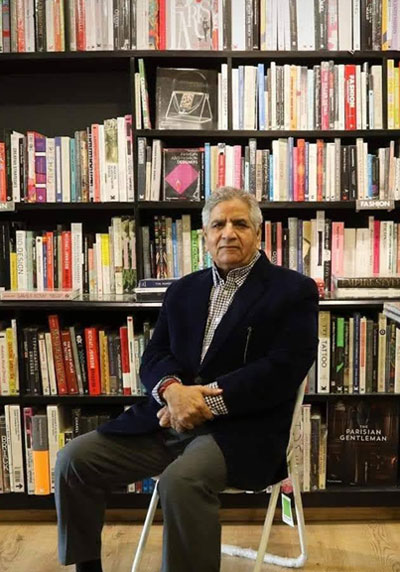Pramod Kapoor, author of 1946: Last War of Independence, Royal Indian Navy Mutiny
 What was it about the Royal Indian Navy mutiny that drew your attention and held your interest for so many years?
What was it about the Royal Indian Navy mutiny that drew your attention and held your interest for so many years?
While researching my earlier book, an illustrated biography of Mahatma Gandhi, I speed read 100 volumes of the Collected Works of Mahatma Gandhi. In volume 89/90 there were letters that Gandhi ji wrote to Sardar Patel and few others in the Congress party. I was intrigued by the content of those letters. Upon further reading, the story started to emerge as something much more than what was usually known. The more I read, the more I discovered and eventually a very poignant, yet very powerful story started to emerge. It kept me on the hunt for more for the past seven years.
Were there moments during this long research when you considered giving it up?
In any long research there are days of hopes and times of despair. The book went through several such patches.
Is it correct to say that post-Independence, neither the Indian nor the Pakistan Navy owned up the rebellion? Could it be because they didn’t view it as part of their history?
There is no doubt in my mind that the rebellion shook the British and hastened independence. There are enough straight and circumstantial evidence in the book to prove my point. The rebellion came at a time when the political class was involved in deep discussion on transfer of power. They felt independence was imminent and did not want any violent or non-violent movement that could rock the boat. Any major movement which did not have the blessings of the two mainstream political parties, Congress and Muslim League, was not encouraged.
Naval mutiny or rebellion as you may choose to call was simply edited out of the history of freedom movement. Sardar Patel as well as Jinnah expressed the sentiment ‘After all we would want discipline in the armed forces…’ in free India or Pakistan. They termed and projected the rebellion as mutiny while it was largely a struggle for independence.
You refer to a few incidents in the RIAF and the British Indian Army, but on the whole they sat out the rebellion. What could be the reason for that?
It is not true that RIAF and British Indian Army were silent spectators. On the third day of the uprising, 21 February 1946, a contingent of 1,500 RIAF men marched as a group together in solidarity, struck work and joined the naval ratings. Army was in touch with the naval strikers and working out strategies. It was this coming together of the forces that rattled the British greatly.
The Indian Army continues to take pride in its British Indian legacy, especially of the World War II. By its account, the British officers regarded Indian sepoys, junior commissioned officers and officers with professionalism and respect, in many cases, affection too. Why was the situation so different with the Royal Indian Navy?
During the days of mutiny, 18-24 February 1946, the Marathas and few other Battalions refused to open fire and similarly the airmen too resisted attempt to terrorize their Indian naval brethren. The Indian Navy, despite the rebellion, had respect for sailors and officers trained in Sandhurst and other British defense establishments. Don’t forget that the first four navy chiefs in independent India were Britishers and they led the Indian Navy until 1958.
While Congress belatedly embraced the INA, with Nehru defending the three INA generals, why did it and the Muslim League distance itself from the naval mutiny?
Purely for political reasons. The INA had caught pan-Indian attention, Netaji had become a household name due to sustained acts of defiance. So much so that even Gandhi ji agreed to it in a statement issued to media towards the end of the mutiny. Royal Indian Navy despite its act of bravery was short lived. Though over 400 people were killed and almost 1,500 injured within three days in Bombay, it was too short a time for the naval uprising to find similar sentiments pan India.
For long regarded as the domain of academics, in the last few years, a lot of modern and contemporary history writing is happening in the literary or popular format. Do you think that academia should recognise this form by incorporating it in the university reading lists?
History whether written by professional historians or articulated by amateurs after going through the scholarly scrutiny, and thorough research must be included in formal history. That is the most legit way of course correction in history. But then more often than not history is dictated and written by the rulers of the time… Alas!
Having spent so many years with the people who populate the Last War of Independence, have you been able to distance yourself from them? Are you ready to move on to the next subject?
Essence of a good book written after deep reading and research never leaves your mind and body. I was deeply influenced by Gandhi ji, whether in agreement or disagreement, he remains in me. Once he enters your psyche you can never get him out. I cannot.
Naval mutiny too influenced me greatly, yet both the books inspired me to do more and move on to the next book.

